The demand for artificial intelligence software (AI) has increased significantly in recent years, and organizations of all sizes are adopting artificial intelligence to stay competitive. During the past couple of years that I’ve spent researching this type of technology, I’ve discovered a range of incredible AI tools, and at what often feels like a moment’s notice, these tools optimize their features and introduce new capabilities to meet the growing needs and demands of users.
I’ve analyzed various artificial intelligence software solutions for different use cases — primarily focusing on business scenarios — to help you determine the best and most relevant AI applications for your needs. This list considers software from AI companies that serve both technical and non-technical teams. Let’s take a look.
Featured Partners: AI Software
Comparison Chart: Top AI Software
The top AI software solutions on the market today cover a broad spectrum of industries and specific use cases. To provide a point of comparison across these categories, we’ve summed up the key characteristics and strengths of each of our top choices in the table below.
| Tool | Company | Best For | Key Features & Capabilities |
|---|---|---|---|
| Azure Machine Learning Studio | Microsoft | Best for Data Scientists & Azure Users |
|
| Databricks Data Intelligence Platform | Databricks | Best for Collaborative Data Workflow Management |
|
| Amazon SageMaker | Amazon | Best for AI & ML Model Deployment |
|
| DataRobot AI Platform | DataRobot | Best for Rapid Model Building & Model Lifecycle Management |
|
| IBM watsonx | IBM | Best for AI Governance & Explainability |
|
| H2O AI Cloud | H2O.ai | Best for AutoML |
|
| C3 AI Platform | C3 AI | Best for Industry-Specific Model Development |
|
| Glean | Glean | Best for Organizational Knowledge Management & Search |
|
| Microsoft Copilot | Microsoft | Best for General Workplace Task Assistance |
|
| Jasper | Jasper | Best for Digital Marketing Agencies & Teams |
|
| Fireflies | Fireflies.ai | Best for Notetaking Assistance |
|
| Salesforce Einstein | Salesforce | Best for Unified Sales, Marketing, & Service Support |
|
| Chorus | ZoomInfo Technologies | Best for Client-Facing & Sales Teams |
|
| Tidio | Tidio | Best for Customer Success Teams |
|
| GPT-4 (ChatGPT) | OpenAI | Best Overall Generative AI Platform |
|
| Vertex AI & Gemini | Google (Alphabet) | Best for Integrated Generative AI & Internet Experience |
|
| Claude 3 | Anthropic | Best for Ethical Generative AI Strategy |
|
| GitHub Copilot | GitHub (Microsoft) | Best for Generative Coding & Developer Assistance |
|
| Cohere Command | Cohere | Best for Enterprise API Usability |
|
| AI21 Studio | AI21 Labs | Best for Task-Specific Models |
|
7 Best AI Software for Model Building & Governance
Cloud and other technology companies are racing to develop AI tools and solutions both for their customers and internal use cases. To meet these goals, a growing number of business users are investing in AI software that helps them build their own models, manage their training data, and govern all aspects of the modeling lifecycle for better outcomes. These are the best solutions I’ve found for model building and governance:
![]()
Azure Machine Learning Studio
Best for Data Scientists & Azure Users
Azure Machine Learning Studio is an AI solution designed to help ML engineers and data scientists train and deploy models and manage the MLOps lifecycle. With this tool, users can create a model in Azure Machine Learning or use a model built from an open-source platform, such as PyTorch, TensorFlow, or scikit-learn. They can also design and build custom models and algorithms to gain insights from data, deploy them in production, and monitor the models’ analytics results as they evolve.
Azure Machine Learning Studio offers several features that simplify data science and machine learning. These include automated machine learning, model management, and interactive visualizations. The Studio version of the tool is designed to be user-friendly and low-code/no-code, so in some ways, its capabilities are limited; the greater Azure Machine Learning environment offers support for more complex use cases and experienced developers who want to go further with their models in Azure.
Pros & Cons
| Pros | Cons |
|---|---|
| Usability of tool & drag-and-drop designer. | Learning curve for new users. |
| Comprehensive documentation & support. | Can be pricey. |
Pricing
Azure Machine Learning Studio (classic) is available in two tiers: Free and Standard.
The standard plan costs $9.99 per ML studio workspace per month, or $1 per studio experimentation hour.
Production Web API pricing works like this:
- Dev/Test: $0 per month.
- Standard S1: $100.13 per month plus overage rates of $0.50 per 1,000 transactions and $2 per API compute hour.
- Standard S2: $1,000.06 per month plus overage rates of $0.25 per 1,000 transactions and $1.50 per API compute hour.
- Standard S3: $9,999.98 per month plus overage rates of $0.10 per 1,000 transactions and $1 per API compute hour.
Key Features
- Data labeling and preparation capability.
- Automated machine learning with monitoring and analysis.
- Drag-and-drop designer.
- Open-source libraries and frameworks.
- Hybrid and multi-cloud model training and deployment.
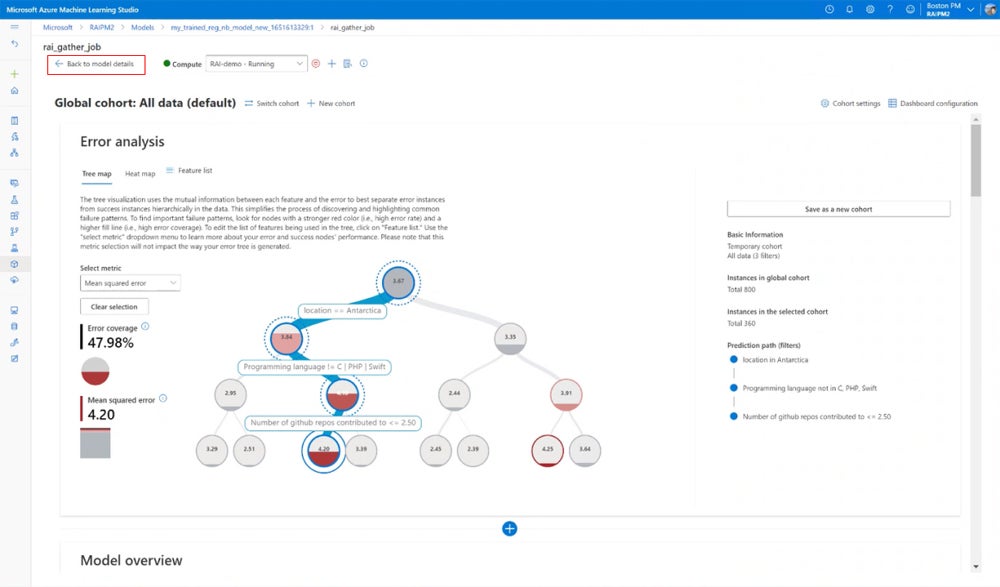

![]()
Databricks Data Intelligence Platform
Best for Collaborative Data Workflow Management
The Databricks Data Intelligence Platform is an innovative solution that combines the strengths of Databricks’ data lakehouse storage infrastructure with several different AI and data workflow management features, including a comprehensive layer of AI, data, and analytics governance capabilities. Many enterprise teams are opting for this solution to develop and manage all aspects of AI technology for their businesses, as it is one of the best tools on the market for prepping and getting to know your data at all levels.
Built on the Databricks open data lakehouse foundation, the Data Intelligence Platform combines the strengths of a lakehouse with generative AI to create its trademark Data Intelligence Engine, which quickly learns and operates in your organization’s data style and lingo. The platform also includes a range of capabilities to support business intelligence, ETL, data warehousing, data analytics, orchestration, and data science. Most recently, Databricks updated the platform with a new addition: DBRX, an open LLM that is now available to all users and is competitive with tools like GPT-3.5.
Pros & Cons
| Pros | Cons |
|---|---|
| Connection to high-powered, industry-leading data lakehouse. | Steeper learning curve for less-technical users. |
| Comprehensive unified governance layer. | Databricks Unit (DBU) pricing structure can get expensive & confusing. |
Pricing
The Databricks platform itself appears to be “free,” but to actually do anything with it, you’ll need to pay for DBU-based product usage. Pricing looks like this, but can be variable, depending on selected cloud, region, volume discount privileges, and other factors:
- Workflows: Starting at $0.15 per DBU.
- Delta Live Tables: Starting at $0.20 per DBU.
- Databricks SQL: Starting at $0.22 per DBU.
- Interactive Workloads: Starting at $0.40 per DBU.
- Mosaic AI Training and Serving: Starting at $0.07 per DBU.
Key Features
- Databricks Unity Catalog for unified governance layer that covers data and AI.
- Mosaic AI for AI lifecycle management.
- Vector search and feature engineering.
- Platform built on data lakehouse.
- Model creation, tuning, and deployment.
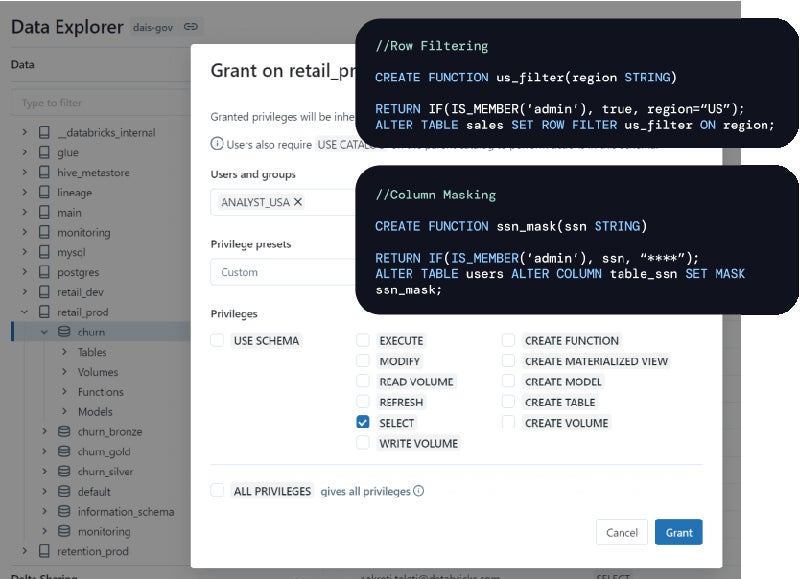

![]()
Amazon SageMaker
Best for AI & ML Model Deployment
Amazon SageMaker is an ML-focused platform from one of the largest and most successful tech companies in the world. With its impressive network of third-party partners and solutions, as well as the tools and capabilities directly available from Amazon and AWS, users can effectively manage the model lifecycle through deployment in several different formats, including edge device, geospatial-data-driven, and embedded AI deployment.
SageMaker includes a diverse array of tools and features to help users prepare their data, build out their models, train models, deploy models, and govern their models, all with supportive features for end-to-end ML. It is one of the best platforms for dedicated deployment support. The platform’s dedicated deployment capabilities include Model Deployment; Pipelines, for CI/CD-driven workflow management; and Edge, to help users learn how to deploy and manage models that run on edge devices on an ongoing basis.
Pros & Cons
| Pros | Cons |
|---|---|
| SageMaker Ground Truth supports built-in human-in-the-loop reviews. | Limited features & capabilities for generative AI modeling. |
| Some features available in AWS Free Tier. | May need to pay separately for each minor component of the platform. |
Pricing
Some SageMaker features and capabilities may be available in a limited format through AWS Free Tier. Otherwise, pricing is typically based on per-hour usage and is highly variable, depending on the global region in which you operate and the version of the tool you select. Sample pricing in the United States may look like this for Amazon SageMaker Studio Classic:
- Standard Instances: Between $0.05 and $6.509 per instance per hour used.
- Compute Optimized: Between $0.102 and $3.672 per instance per hour used.
- Memory Optimized: Between $0.151 and $7.258 per instance per hour used.
- Accelerated Computing: Between $0.94 and $28.50 per instance per hour used.
Key Features
- Data preparation, governance, and lifecycle management, including for geospatial data and ML.
- SageMaker Notebooks and Studio Labs to comprehensively test model ideas.
- HyperPod, purpose-built AI/ML training infrastructure.
- End-to-end ML with MLOps and Studio interfaces.
- Ground Truth solution for human-in-the-loop feedback mechanisms.
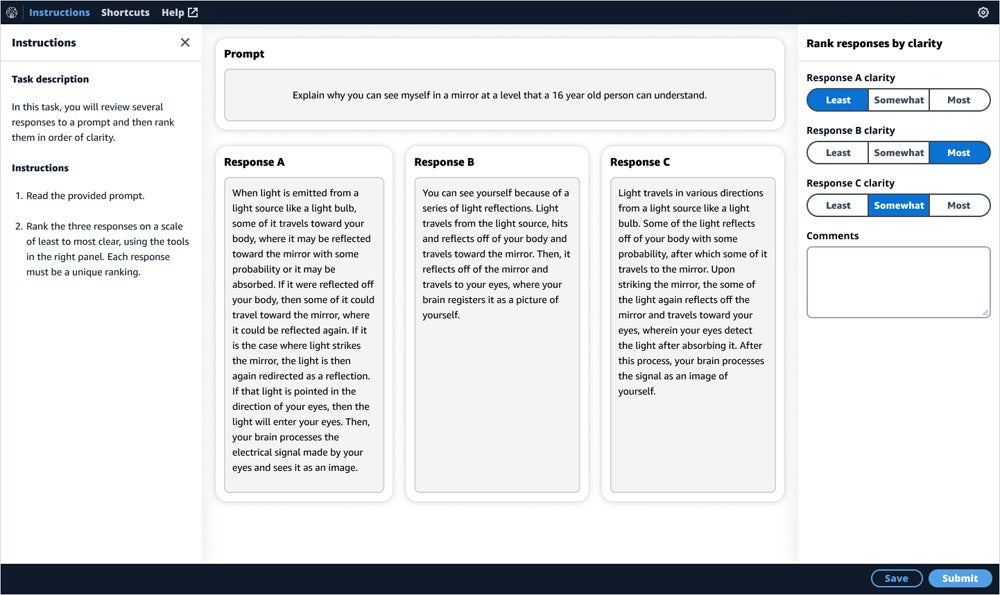

![]()
DataRobot AI Platform
Best for Rapid Model Building & Model Lifecycle Management
DataRobot AI Platform is an automated, end-to-end platform for developing and deploying AI models, helping organizations process and analyze data to derive important business insights. The platform provides tools and resources for data science teams to build, tune, and deploy models, and it allows users to explore models from various algorithms to select the best-fit models for their datasets. The DataRobot AI Platform can be deployed as multi-tenant SaaS, single-tenant SaaS, self-managed VPC, or self-managed on-premise. It is a helpful tool for teams — including inexperienced teams — to get up and running with AI models quickly, as many of its features are automated and unified for both generative and predictive modeling.
The platform includes features for deployment and operations, AI governance and management, and model building and fine-tuning. Additionally, the platform comes with particularly user-friendly visuals that are color-coded and clearly labeled.
Pros & Cons
| Pros | Cons |
|---|---|
| Real-time predictions & monitoring. | Somewhat inflexible retraining automation. |
| Helpful, automated compliance documentation. | Difficult to set up. |
Pricing
DataRobot doesn’t advertise specific pricing on its page. However, they do mention two plans: Essential 9.0 and Business Critical 9.0. More specific pricing information is available upon request.
Key Features
- Modeling data preparation.
- Model building, validation, performance monitoring, and governance.
- Integration with third-party services like GitHub, Hugging Face, Streamlit, Azure Machine Learning, Amazon SageMaker, mlflow, and Apache Airflow.
- Support for and compatibility with data platforms like Snowflake, Google Cloud Storage, Amazon S3, Amazon Redshift, Google Big Query, Azure Synapse Analytics, SAP, Databricks, and Microsoft Azure Data Lake.
- Supported business apps and intelligence solutions include SAP, Salesforce, Power BI, Tableau, and ThoughtSpot.


![]()
IBM watsonx
Best for AI Governance & Explainability
IBM watsonx is a new generation of Watson’s AI products and solutions that span across AI model-building, open data lakehouse storage, AI governance, conversational AI chatbots, task and efficiency management, and code generation and assistance. It is a highly modular platform, with users getting to choose between watsonx.ai, watsonx.data, watsonx.governance, watsonx Assistant, watsonx BI Assistant, watsonx Orchestrate, watsonx Code Assistant, or some combination of these tools and AI assistance services.
AI governance, AI ethics, and regulatory-compliance-focused features include a commitment to only using trusted datasets for training, hands-on data and AI governance tools for users, and a hybrid and governed large-scale data store. With watsonx.governance specifically, users can benefit from a platform-agnostic governance approach that works on platforms like Amazon SageMaker, Amazon Bedrock, Google Vertex, Microsoft Azure, and watsonx.ai. Especially as AI regulations ramp up in the coming years, this is an impressive tool for organizations that want to quickly scale their governance practices.
Pros & Cons
| Pros | Cons |
|---|---|
| Comprehensive, enterprise-ready features. | Confusing pricing approach. |
| Various model health and governance management features. | Limited non-English capabilities. |
Pricing
Pricing for most watsonx platform features is based on the number of virtual processor cores (VPCs) a user requires. Three SaaS tiers are currently available: Trial, Essentials, and Standard. These tiers include watsonx.ai, watsonx.data, and watsonx.governance:
- Trial: Free, limited trial of watsonx.ai and watsonx.data that includes limited ML functionality and inference tokens per month, as well as 2,000 free watsonx.data Resource Units. It also now includes limited Resource Units and features for watsonx.governance.
- Essentials: A $0 per month tier fee plus RU-based token pricing per 1,000 tokens, ML tools and runtime based on Capacity Unit Hours used per billing month, supporting services at $3 per hour, cache optimized node at $2.80 per hour, and compute optimized node at $6.50 per hour. watsonx.governance usage costs $0.60 per Resource Unit.
- Standard: A $1,050 per month tier fee plus similar component-based pricing to the Essentials plan.
Key Features
- AI and ML model building, training, fine-tuning, and validation.
- Hybrid-cloud-compatible data lakehouse store with shared metadata layer and workload optimization.
- Automated model and workflow documentation.
- Model health, accuracy, drift, and bias management.
- Governance features that include approval workflows, risk scorecards, and model metadata management solutions.
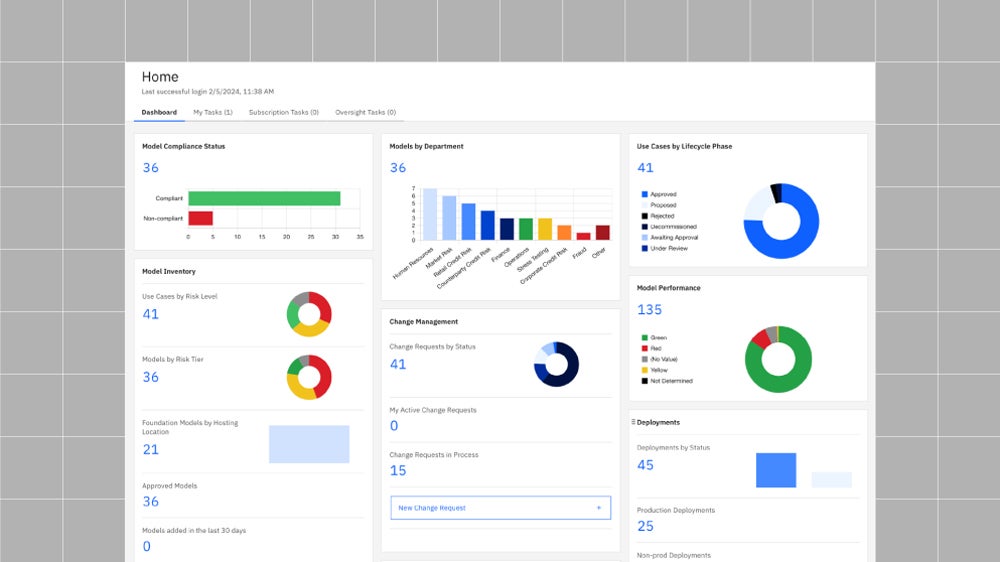

![]()
H2O AI Cloud
Best for AutoML
H2O AI Cloud is an enterprise AI and ML platform that comes from H2O.ai, a leading AI cloud company with over 10 years of experience developing AI and ML solutions. The company’s goal is to democratize AI and make it accessible to organizations of all sizes.
In addition to the core H2O AI Cloud platform, H2O.ai also offers the open-source generative AI solution, h2oGPT, which provides tools (H2O LLM Studio, a framework and no-code GUI) for data scientists and developers to build and deploy large language models and chatbot applications. Most recently, the company also released Danube2-18B, an open-source LLM that is both user-friendly and enterprise-quality.
H2O AI Cloud provides comprehensive automated machine learning (autoML) capabilities and no-code deep learning engines through a flexible and scalable cloud platform. The autoML approach in particular makes it possible for users of all different backgrounds to work with the interface’s no-code UI to develop usable workflows and pipelines.
Pros & Cons
| Pros | Cons |
|---|---|
| Quality customer support. | No pricing transparency. |
| Collaboration promoted through open-source technology. | Limited & ineffective documentation. |
Pricing
H2O.ai doesn’t advertise its rates on its website. They encourage interested buyers to request a demo, and quotes will be sent after the demo based on the buyer’s needs. Publicly available pricing information from AWS Marketplace shows that H2O AI Cloud costs $50,000 per unit, with a minimum of four AI units.
Key Features
- Distributed, in-memory processing.
- AutoML capability.
- Various algorithms, including Random Forest, GLM, GBM, XGBoost, GLRM, and Word2Vec, for distributed computing and for both supervised and unsupervised techniques.
- No-code deep learning engines.
- Fully managed and hybrid cloud deployments.
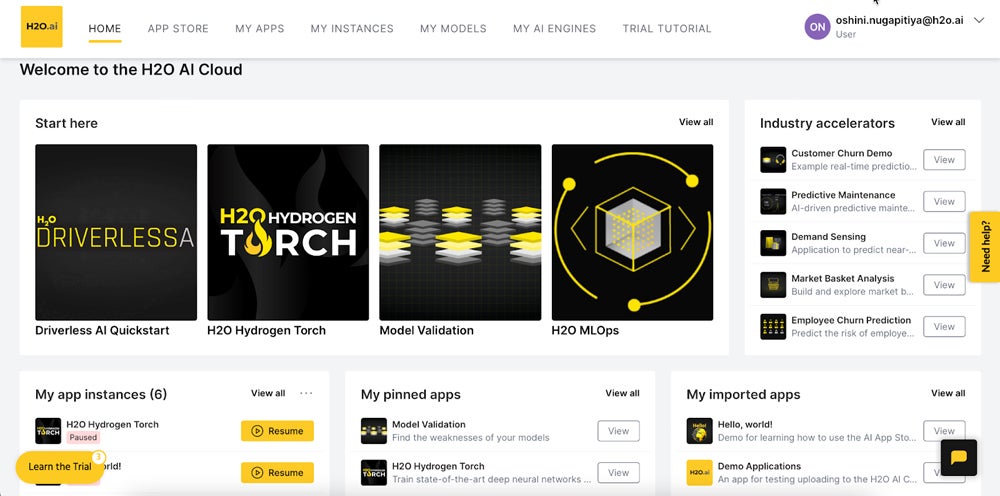

![]()
C3 AI Platform
Best for Industry-Specific Model Development
The C3 AI Platform is a unique enterprise AI solution that supports digital transformation projects on an enterprise scale while still remaining accessible to both technical and non-technical team members. C3 AI enables users to ideate, plan, build, deploy, and maintain enterprise AI applications, including for highly specific industries and industrial use cases. For example, one set of C3 AI applications is prebuilt and designed for manufacturing problems and challenges, including inventory parameter management, supply chain variable calculations, and automated recommendations for inventory analysts.
C3 AI Platform customers primarily come from highly regulated sectors with complex workflows, including manufacturing, oil and gas, utilities, financial services, defense and intelligence, government, healthcare, telecommunications, transportation, and retail. The platform includes a democratized AI studio space, open architecture, and a shared data and model ontology to speed up and improve model deployments.
Pros & Cons
| Pros | Cons |
|---|---|
| Purpose-built tools available for complex & industry-specific use cases. | Purportedly high initial investment costs. |
| Robust security, model operationalization, and enterprise-ready features. | Somewhat limited customization opportunities. |
Pricing
C3 AI is not transparent with its pricing information or plans. Prospective buyers will need to contact the company directly for more information.
Key Features
- AI feature store and model development tools, including C3 AI Studio.
- Model ops and DevOps workflows.
- Deployment platform services.
- Industry-specific, prebuilt AI application sets.
- Data integration, preparation, visualization, and governance capabilities.
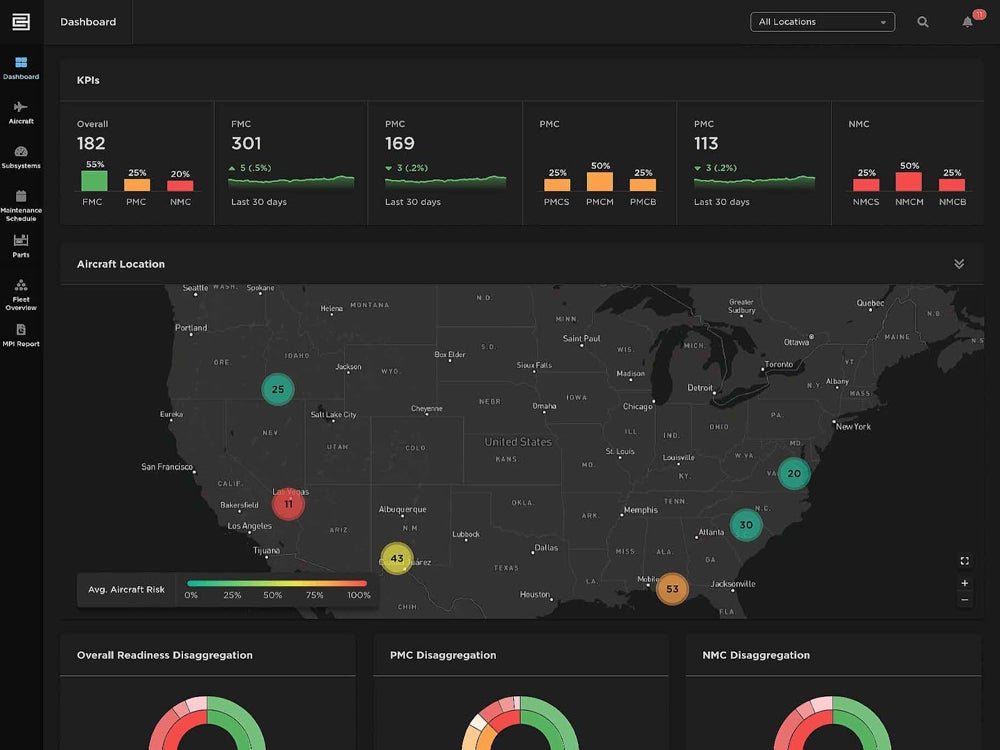

4 Best AI Software for Business Operations & Workflows
![]()
Glean
Best for Organizational Knowledge Management & Search
Glean is a generative AI platform that focuses on organizational knowledge management and enterprise search, giving employee users at all levels the tools they need to find, access, save, and share different kinds of business documents and data. All users receive access to the workplace search feature, which is accompanied by an AI assistant that can help users find answers and content that is geared for their specific role, search query, and search history and habits.
From an administrative perspective, the platform also does a compelling job of storing information in such a way that it’s easy to update outdated resources, manage privacy and compliance, and create teams and environments for productive collaboration. Many users also appreciate how Glean’s knowledge graph, plug-ins and connectors, and work hub platform combine the best of both ease of use and customizable workplace search and knowledge management.
Pros & Cons
| Pros | Cons |
|---|---|
| Smart and customizable enterprise search solution. | Limited customer support availability. |
| Intuitive UI for technical & non-technical users. | Can get expensive. |
Pricing
According to a Glean representative, the product is priced per user per month and billed at an annual flat rate. Though the website does not transparently list plans or rates, the Glean customer service representative with whom we chatted shared that different packages are available based on company size and scalable goals. The company typically requires a $40,000 annual contract minimum for teams with fewer than 100 users.
Key Features
- Customizable collections and Go Links for organization-specific knowledge management.
- Vector search with semantic understanding and NLP for plain-language user queries.
- Data governance and compliance features such as DLP reports, GDPR and CCPA compliance, and user access reviews.
- Workplace search, AI assistants, and work hub for UX-focused enterprise knowledge management.
- Slack and other third-party connectors for knowledge management across business applications.
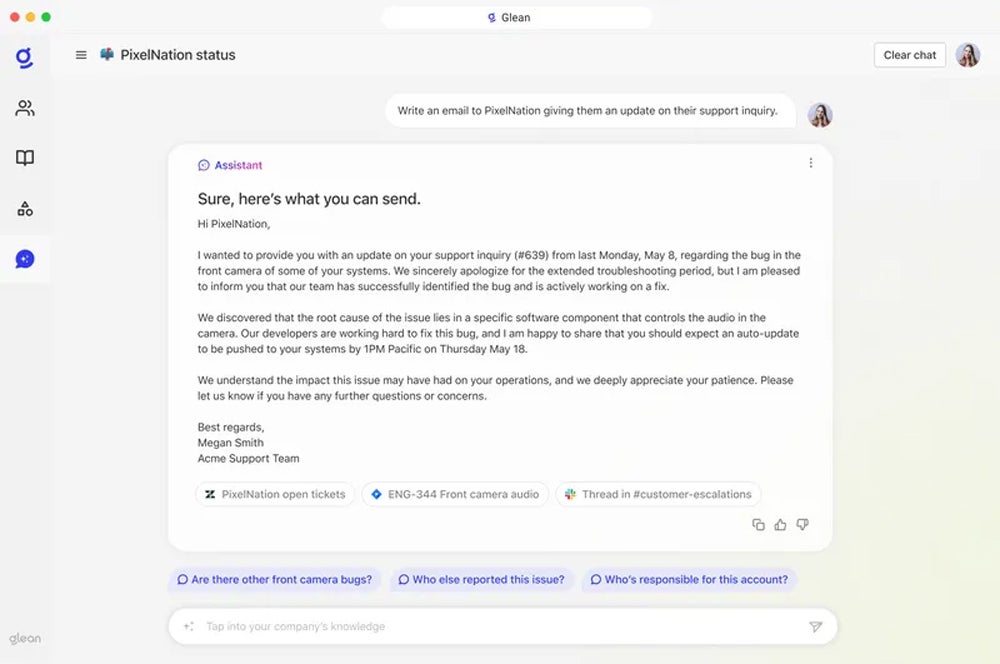

![]()
Microsoft Copilot
Best for General Workplace Task Assistance
Microsoft Copilot is a built-in AI assistant that works within several Microsoft products. A free chat interface is available and works similarly to ChatGPT and Gemini, offering several great multimodal capabilities. However, Microsoft’s copilot technology really shines in Microsoft 365 in particular, where tools like Word, Teams, Excel, and others have built in smart assistance, content completion, automations, and workflow support for some of the most common daily and routine business tasks.
Because so many businesses rely on the Microsoft Suite tools for their business operations, this tool has quickly grown in popularity. Microsoft Copilot is also available in a handful of other Microsoft business tools, including PowerApps, Dynamics 365, and Power BI (in preview).
Pros & Cons
| Pros | Cons |
|---|---|
| Built-in AI assistance across Microsoft products. | Expensive to scale features for larger business teams. |
| Copilot that can expertly handle various business tasks & automations. | Most features require Microsoft subscriptions, leading to additional costs & vendor lock-in. |
Pricing
Pay-as-you-go pricing is a key component of many Microsoft products, including the account users sign up for to use Microsoft Copilot business tier products. The online chat interface of Microsoft Copilot can be freely accessed or upgraded to Copilot Pro for $20 per user per month.
For the most popular business-specific Microsoft Copilot solutions, here’s what pricing looks like:
- Copilot for Microsoft 365: $30 per user per month, billed annually, in addition to Microsoft 365 subscription costs.
- Copilot Studio: $200 for 25,000 messages per month.
- Microsoft Copilot for Sales: $50 per user per month; annual commitment required.
Key Features
- Copilot for Microsoft 365 for built-in AI assistance and workflow automations.
- GPT-4-powered content generation.
- Microsoft Graph grounding.
- Microsoft Copilot Studio for customizable copilots.
- Enterprise data protection and scalability.
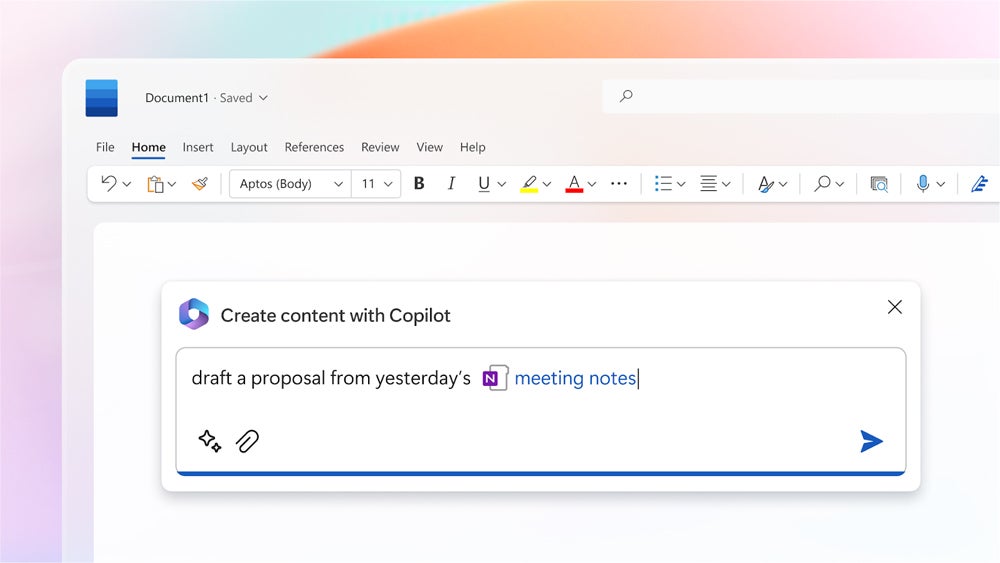

![]()
Jasper
Best for Digital Marketing Agencies & Teams
Jasper is a suite of AI copilot tools that focuses on supplementing digital and content marketing efforts across social media and web channels. Its tools cover a range of features and functions, including art and image generation for ads and thumbnails, AI content templates, chatbots that provide customer and user assistance, automated end-to-end marketing campaigns, and smart understanding for brand voice and style guides.
Many users select Jasper because the platform can generate content based on the context users provide, including descriptions of what they want content to include, knowledge about specific products or services, instructions on tone of voice and audience, SEO guidance, and style guides.
Many digital marketing teams and agencies also select Jasper for its ease of use and ability to integrate with existing marketing tools. The Jasper API, Chrome browser extension, and a variety of collaboration tools make the Jasper For Business version of the platform a particularly effective tool for holistic marketing strategies and extensibility.
Pros & Cons
| Pros | Cons |
|---|---|
| Multiuser & multilingual format. | Somewhat confusing interface. |
| Smart brand guide & styling tools. | Few features for video marketing. |
Pricing
Jasper is available in three main subscription plans:
- Creator: $39 per month, billed annually, or $49 billed monthly. Includes one seat and one brand voice. A 7-day free trial is also available.
- Pro: $59 per month per seat, billed annually, or $125 per seat, billed monthly. Includes one seat and the ability to add up to five seats; also includes three brand voices, 10 knowledge assets, and three Instant Campaigns. A 7-day free trial is also available.
- Business: Prospective buyers will need to contact Jasper’s sales team for pricing information.
Key Features
- AI-powered content writing, editing, social copywriting, and content strategy.
- Instant and automated marketing campaigns.
- Brand voice guide uploads and content application.
- SEO integrations and content optimization.
- SEO, social media, content management, and other digital-marketing-friendly integrations, as well as Jasper API for custom integrations and embeds.
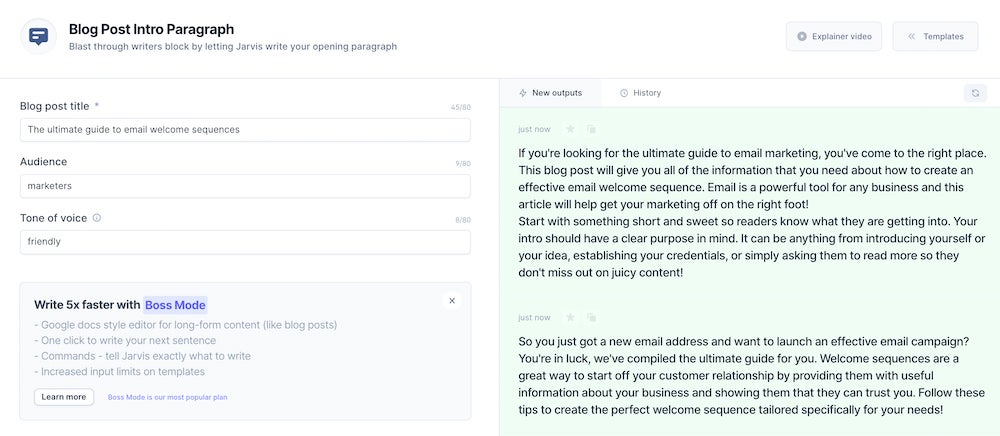

![]()
Fireflies
Best for Notetaking Assistance
Fireflies is an AI-powered note-taking platform that automates the process of capturing meeting information, including audio transcripts, text notes, and highlights. It uses machine learning and natural language processing (NLP) to transcribe meeting recordings and provide users with actionable notes to save them hours of manual post-meeting note-taking and follow-up.
Beyond its basic content summarization features, Fireflies has also continued to expand its conversation analytics and search capabilities. With these two features, users can get a more enterprise-level experience out of an otherwise-simple AI tool, learning more about what was said and how while also quickly pulling important conversational snippets out of longer transcripts. Most recently, Fireflies has come out in a mobile app version.
Pros & Cons
| Pros | Cons |
|---|---|
| Easy to set up & use. | Issues with search capability. |
| Speaker-focused analytics. | Occasional lags. |
Pricing
Four pricing tiers are available for Fireflies:
- Free: No cost for up to 800 mins of storage.
- Pro: $10 per seat per month, billed annually, or $18 per seat per month, billed monthly.
- Business: $19 per seat per month, billed annually, or $29 per seat per month, billed monthly.
- Enterprise: $39 per seat per month, billed annually; no monthly billing option.
Key Features
- Chrome extension.
- CRM, Zapier, and Slack integrations.
- Team and security management capabilities.
- Meeting clips as sound bytes.
- Topic tracker and analytics.
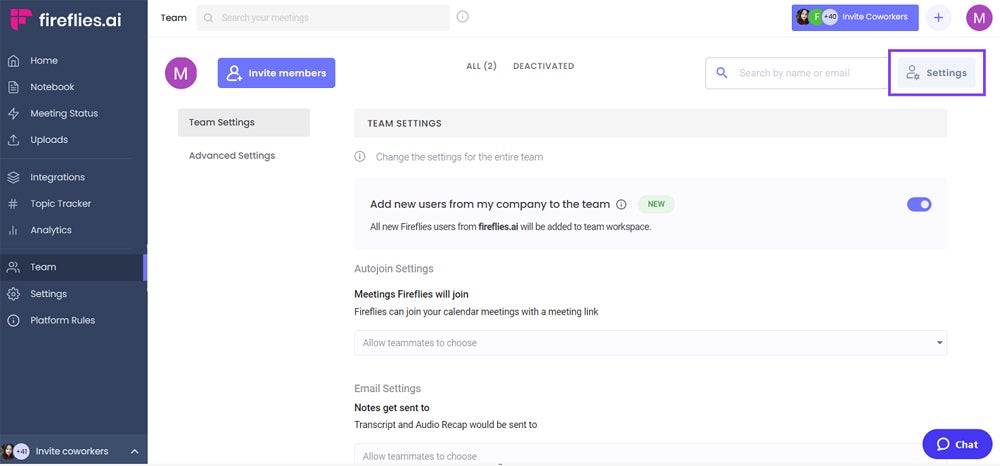

3 Best AI Software for Customer Service & User Experience
![]()
Salesforce Einstein
Best for Unified Sales, Marketing, & Service Support
Salesforce Einstein is a family of AI tools and solutions that are available across the Salesforce ecosystem. Whether you use Salesforce for marketing, sales, service, e-commerce, or some combination of all of these, dedicated Einstein AI capabilities have been designed to automate customer data and experience management in smart ways.
The design of Salesforce itself, with its separate clouds that work seamlessly in a united platform, makes its Einstein AI technology particularly practical and effective. Businesses can easily manage customers throughout their buyer lifecycle, from the time they’re a prospective buyer who requires dedicated marketing campaigns until they become a loyal customer who benefits from frequent nurture campaigns or customer service workflows.
Pros & Cons
| Pros | Cons |
|---|---|
| AI features incorporated into all Salesforce cloud applications. | AI only works with Salesforce products. |
| Trust Layer for best practices, privacy, & security. | Some mobility limitations. |
Pricing
Certain Saelsforce cloud subscription tiers include access to Einstein capabilities. These are your best options for Einstein access:
- Einstein 1 Sales: $500 per user per month, billed annually.
- Einstein 1 Service: $500 per user per month, billed annually.
- Marketing Cloud Growth Edition: $1,500 per month.
Key Features
- Generative and predictive intelligence through Sales AI features.
- AI for Customer 360.
- Conversational analytics and recommendations.
- Smart chatbot building technology.
- Automated marketing campaign generation.
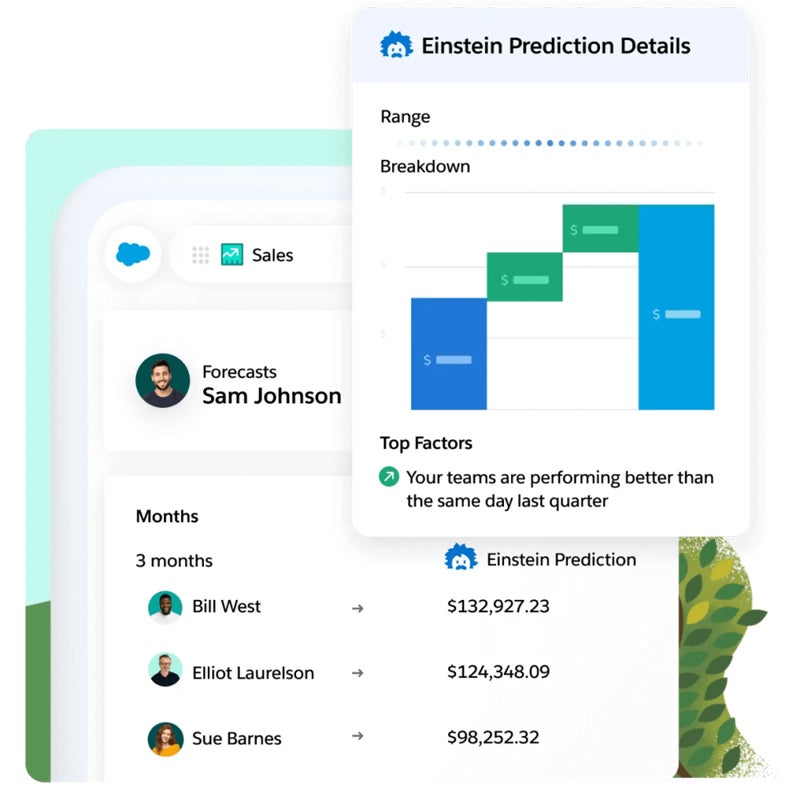

![]()
Chorus
Best for Client-Facing & Sales Teams
Chorus is a conversational intelligence and recording solution that helps users analyze all customer engagements across video conferencing, phone calls, and email channels to learn about their performance in these engagements. With this in-depth data, teams can work to convert prospects into paying customers and forecast future outcomes more accurately.
Chorus comes with features like sales call analysis, deal intelligence, relationship management focused on CRM data, and other advanced AI-driven insights to help teams modify actions for better customer conversations. Since its acquisition by ZoomInfo, Chorus also includes more advanced integrated intelligence about customer contacts and the company, which benefits go-to-market teams even more.
Pros & Cons
| Pros | Cons |
|---|---|
| High-quality transcription & recording. | Limitations for non-native English speakers. |
| Useful deal intelligence & pipeline management. | Issues with search functionality. |
Pricing
ZoomInfo, which acquired Chorus.ai, doesn’t publicly advertise its pricing on its website unless you fill out an information request form. However, the company pricing page shows that they offer three plans: Sales, Marketing, and Talent. ZoomInfo usually charges based on your required features, functionality, license number, and credit usage.
Key Features
- Sales call analysis.
- Snippet tool.
- Automatically join Zoom meetings.
- Talk time percentages.
- Supported languages include German, English, French, Italian, Japanese, Dutch, Portuguese, Spanish, and Chinese (Traditional).
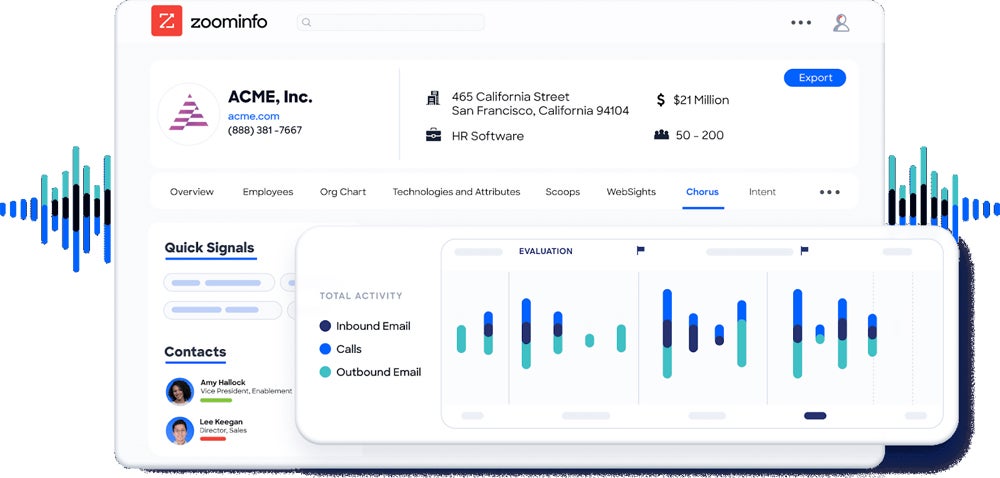

![]()
Tidio
Best for Customer Success Teams
Tidio is a live chat and chatbot platform for customer support, sales, and marketing. It enables businesses to communicate with customers and visitors in real time and analyze and optimize their conversations.
It offers a suite of useful sales and CX-focused features, including automated chatbot responses, integrated messaging apps, AI-based automated responses, and integrations with third-party software. The Lyroi AI Chatbot and Reply Assistant are two of its most effective AI capabilities, helping businesses create smoother customer service and response workflows.
Pros & Cons
| Pros | Cons |
|---|---|
| Supports real-time customer communication. | AI chatbots are only available in Tidio+. |
| User-friendly setup. | Can be pricey. |
Pricing
Tidio offers various pricing plans, with one free and five paid plans.
- Free: No cost for up to three seats, 50 handled conversations, 100 chatbot triggers, 50 free Lyro conversations, limited workflow and campaign capabilities, and unlimited tickets.
- Starter: $24.17 per month, billed annually, or $29 per month for up to three seats, 100 handled conversations, 500 chatbot triggers, and unlimited tickets.
- Growth: Starting at $49.17 per month, billed annually, or $59 per month for tiered conversation handling options up to 1,000 and several advanced features.
- Tidio+: It’s a personalized plan designed for various enterprise use cases. It starts at $499 per month.
- Lyro AI: Starting at $32.50 per month, billed annually, or $39 billed monthly.
- Flows: Starting at $24.17 per month, billed annually, or $29 billed monthly.
- Campaigns: Starting at $8.33 per month, billed annually, or $10 billed monthly.
Key Features
- Messenger, Instagram, and email integrations.
- Live chat conversations and chatbot triggers.
- Built-in analytics.
- Native Shopify and WordPress actions.
- Lyro AI Chatbot and Reply Assistant.
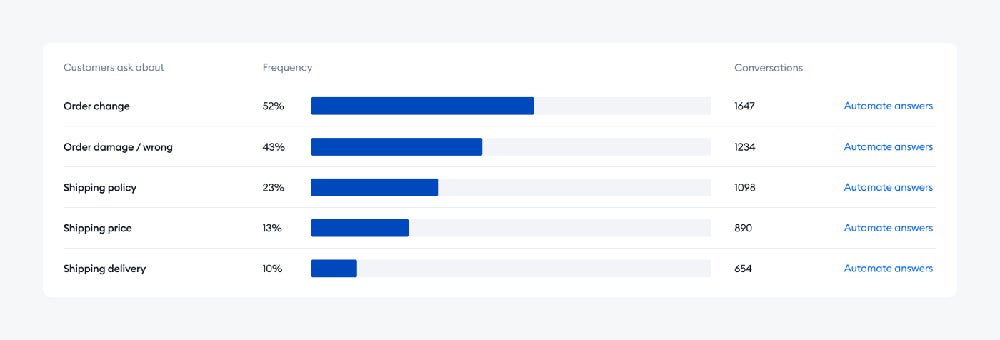

6 Best AI Software for Enterprise Generative AI
![]()
GPT-4 (ChatGPT)
Best Overall Generative AI Platform
Released in November 2022, ChatGPT is a language model developed by OpenAI that interacts with users conversationally. It allows you to have a human-like conversation with the artificial intelligence tool, which has the ability “to answer follow-up questions, admit its mistakes, challenge incorrect premises, and reject inappropriate requests.”
Business users can use ChatGPT to brainstorm ideas, create first drafts, generate outlines, email ideas, or discuss complex concepts. With the tool’s increasing modality that has come with GPT-4, users can also generate images and videos and benefit from internet connectivity for more up-to-date results.
While ChatGPT offers many benefits, some companies have banned or limited its usage by their employees for compliance reasons and to prevent the release of confidential information. I highly recommend that all business leaders who choose to use ChatGPT and GPT-4 in their businesses also develop a usage policy and train their employees on appropriate use, as proprietary data can easily be misused in the tool.
Pros & Cons
| Pros | Cons |
|---|---|
| Innovative R&D pipeline; pioneer in generative AI. | Room for bias & error in model training. |
| GPT-4o available to all users. | Quick innovation pace leads to ethical & other concerns. |
Pricing
ChatGPT and GPT-4 pricing varies based on your chosen model and prompt. Here’s what pricing looks like for GPT-4 models:
- GPT-4o: $5 per 1 million input tokens and $15 per 1 million output tokens. Additional costs may arise based on selected resolution. Limited, free access to this model and its capabilities is available in ChatGPT at all tiers, including the free tier.
- GPT-4 Turbo: $10 per 1 million input tokens and $30 per 1 million output tokens. Additional costs may arise based on selected resolution.
- GPT-4: Between $30 and $60 per 1 million input tokens and between $60 and $120 per 1 million output tokens.
ChatGPT subscriptions are also available for users who simply want to benefit from GPT-4 functionality without working on their own model use cases.
Key Features
- Multimodal content generation.
- Code generation and debugging.
- Internet connectivity in certain subscription levels.
- Free and paid plans, with all plans getting access to at least GPT-4o capabilities.
- Natural language, “chat-like” format with conversational history.
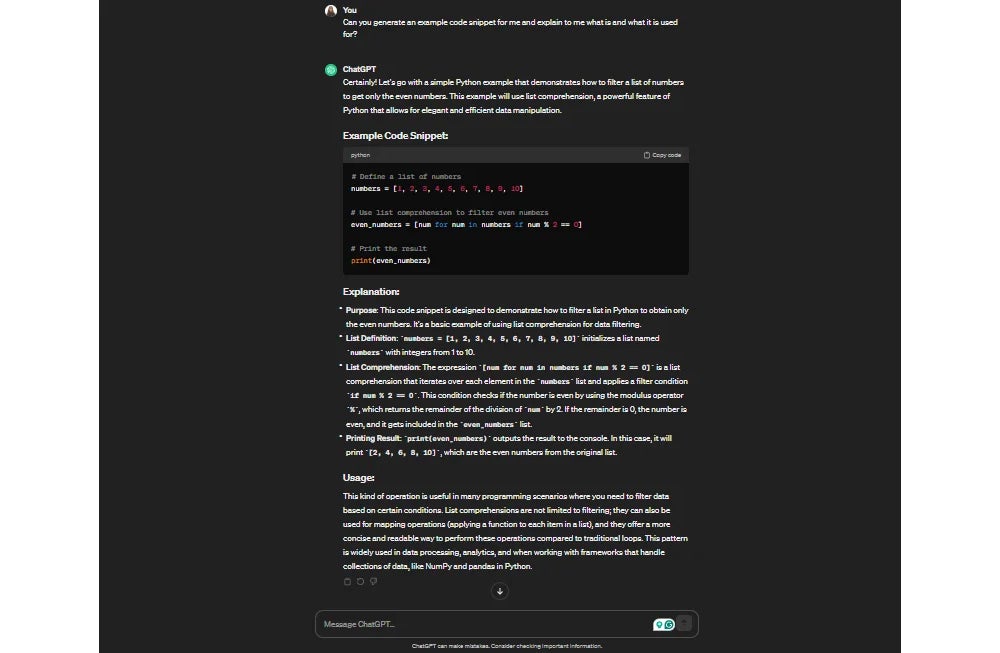

![]()
Vertex AI & Gemini
Best for Integrated Generative AI & Internet Experience
Vertex AI is Google’s enterprise AI development platform that includes a range of capabilities and models. Most recently, it has added the highly-praised Gemini models to its collection, including Gemini 1.5 Pro and Gemini 1.5 Flash. In Vertex AI, users can build custom instances of their favorite AI models, training, fine-tuning, and comprehensively testing performance metrics within the platform. The platform is designed to unify data and AI in such a way that users can develop models with little lag time or error.
The Gemini aspect of Vertex AI is one of my personal favorites. Compared to most other generative AI models, I like how well Gemini integrates with Google Search mechanisms, even with widgets that focus on specific types of search (travel, for example). I also appreciate how well this model incorporates user feedback into its performance improvement plans.
Pros & Cons
| Pros | Cons |
|---|---|
| Access to more than 150 foundation models, including Gemini models. | Some comparative difficulties with initial implementation. |
| Multimodal & intuitive content generation approach. | Considerable learning curve for Vertex AI, especially for less-technical users. |
Pricing
Pricing for Vertex AI is highly variable. First, you’ll need to determine what model type and data format you’re working with (image, video, tabular, or text data). Model options include training, edge on-device training, deployment and online prediction, and batch prediction models. Each of these listings has a different per-node-hour pricing setup. Additional costs are accrued based on Vertex AI Forecast selections, machine types in use, accelerators in use, disks in use, region, and more. To find out exactly how much Vertex AI (and accompanying models like Gemini) will cost for your business, check out the pricing page here.
Key Features
- Vertex AI Studio and Agent Builder.
- 150+ foundation models.
- Access to the latest Gemini models.
- Multimodal content generation.
- Real-time internet connection and widgets.
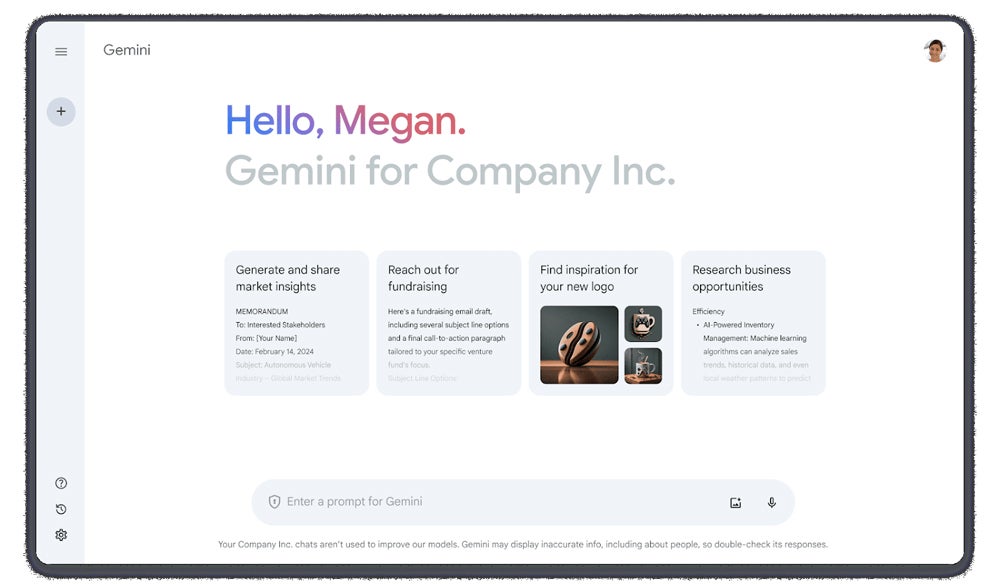

![]()
Claude 3
Best for Ethical Generative AI Strategy
Claude 3 is the latest generation of Anthropic’s Claude, a generative AI model and chat interface that emphasizes ethical outcomes as much as high performance. The newest generation of Claude stands out for a few reasons: It continues to rely on the company’s standard Constitution AI framework and other ethical AI standards, but it has also improved its abilities, adding a larger context window, fewer refusals, and additional responsible design features.
Depending on your requirements, you can work with either Claude 3 Opus, the larger and more intelligent version of the model, or Claude 3 Sonnet, the lightweight and simpler version of Claude 3. There’s also Claude.ai, a free, online version of the tool that works well for users who only need access to simple chat capabilities. My personal favorite thing about the Claude interface is the ability to add attachments to my queries.
Pros & Cons
| Pros | Cons |
|---|---|
| Committed to Constitutional AI methodology. | Incredibly expensive for larger model version access. |
| Impressive context window size. | Limited free tier capabilities. |
Pricing
Pricing for Claude 3 is as follows:
- Claude 3 Haiku: $0.25 per 1 million input tokens and $1.25 per 1 million output tokens.
- Claude 3 Sonnet: $3 per 1 million input tokens and $15 per 1 million output tokens.
- Claude 3 Opus: $15 per 1 million input tokens and $75 per 1 million output tokens.
Users also have the option to access legacy models — including Claude 2.1, Claude 2.0, and Claude Instant — as well as claude.ai, a free online version of the tool.
Key Features
- Free Claude access through Claude.ai.
- Constitutional AI review and quality management framework.
- At least 200K context window.
- Red teaming evaluations.
- Multiple versions, including Opus and Sonnet.
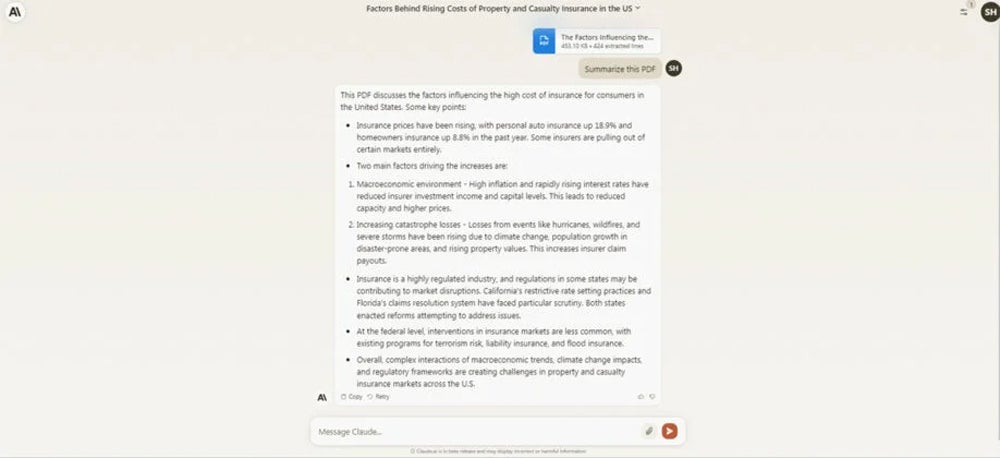

![]()
GitHub Copilot
Best for Generative Coding & Developer Assistance
GitHub Copilot is a collaboration among GitHub, Microsoft, and OpenAI that supports developers — including student developers with minimal coding skills — with programming, code completion, and code quality assurance tasks. This particular Copilot is unique in that it works effectively for highly technical tasks but allows users to query and improve their code through natural language.
Most recently, an enterprise version of GitHub Copilot was released. This more advanced solution includes a range of chat capabilities, including a beta web search capability powered through Bing; several code completion capabilities; smart actions; multiple IDE; and other supported environments; and comprehensive management and policy features for organizations that need to keep their code aligned with organizational and larger compliance standards.
Pros & Cons
| Pros | Cons |
|---|---|
| Accessible price points for individuals & teams. | Potential for user errors related to code divisions. |
| Code quality assurance and public-code-blocking mechanisms. | Possible data privacy concerns. |
Pricing
Pricing plans are available for both individuals and business teams:
- Copilot Individual: $10 per month or $100 per year for one user.
- Copilot Business: $19 per user per month.
- Copilot Enterprise: $39 per user per month.
Key Features
- Natural language chat interface.
- Real-time AI coding suggestions.
- Vulnerability prevention system.
- Collaborative coding and automated environment setup.
- Personalized answers with inline citations to organizational knowledge base.
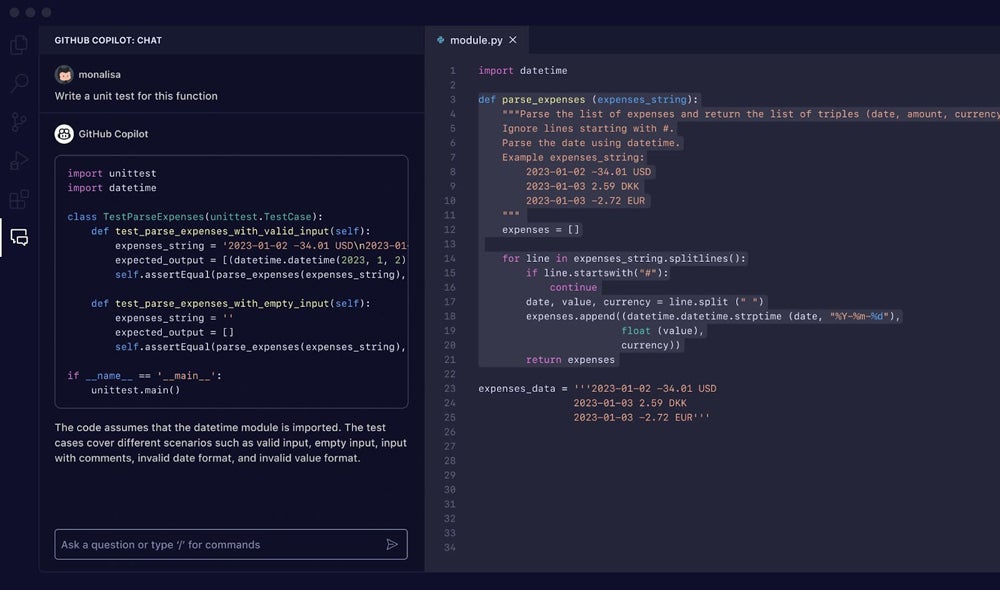

![]()
Cohere Command
Best for Enterprise API Usability
Cohere Command is one of the latest and greatest collections of generative models from Cohere, considered a pioneer and leader in the generative AI space. Most recently, the company has released its R and R+ series of Command models to the public; these models intend to meet the needs of enterprise users in areas like content summarization, research, and analysis while also offering a range of lightweight and heavyweight options. The Cohere Command models are the engine behind Cohere Generate, an LLM text generation solution that is frequently customized by business users.
Cohere’s models can be used as-is or fine-tuned and customized to align with more specific business use cases. Its API and accompanying documentation are some of the best in this area, offering incredibly straightforward information about how to get started and scale with your own projects. Helpful SDK and getting started documentation is also available.
Pros & Cons
| Pros | Cons |
|---|---|
| Easy-to-use and well-documented API. | Generally not as powerful, accurate, or accessible as similar competitors. |
| User-friendly Cohere Playground. | Users complain about occasional bugs and output oddities. |
Pricing
Access to Cohere’s Command model is available in both free and paid options:
- Free: Limited, pre-production access to Cohere models and features.
- Command R Default Model: $0.50 per 1 million input tokens and $1.50 per 1 million output tokens.
- Command R+ Default Model: $3 per 1 million input tokens and $15 per 1 million output tokens.
- Command R Fine-Tuned Model: $2 per 1 million input tokens, $4 per 1 million output tokens, and $8 per 1 million training tokens.
- Enterprise: Pricing information available upon request.
Key Features
- Playground environment to test Command and other model functionalities.
- Command R and Command R+ options.
- Retrieval augmented generation (RAG).
- Default and fine-tuned model options.
- Quickstart guides and well-documented API reference.
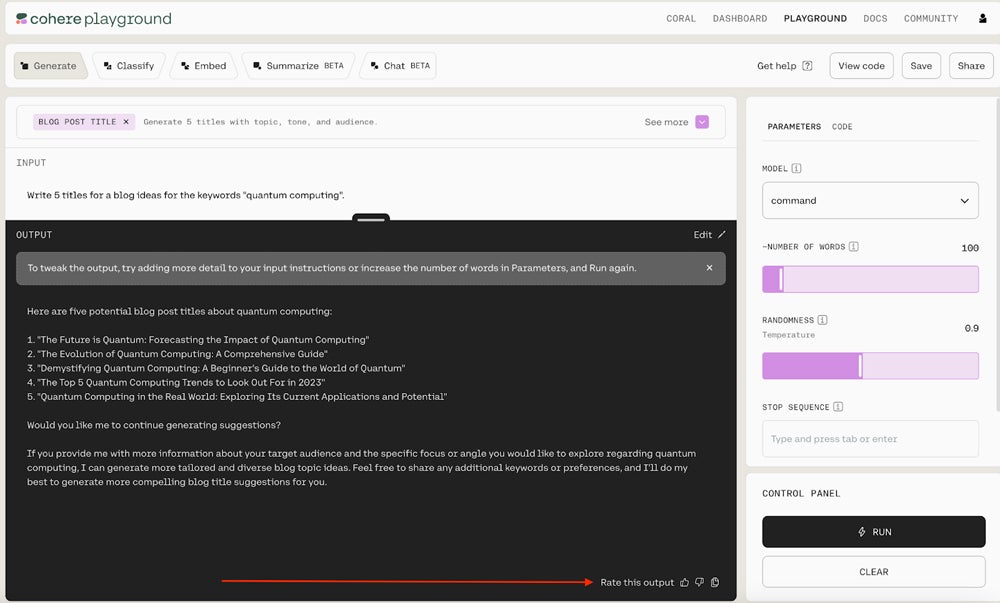

![]()
AI21 Studio
Best for Task-Specific Models
AI21 Studio is an interactive and accessible interface for business users who want to work with AI21 Labs’ foundation and task-specific models. Users frequently praise its easy-to-use interface, API documentation, and enterprise scalability. One of its greatest assets is access for unlimited users in each of its plans; this approach makes it an especially strategic investment for larger teams that want to experiment with and collaborate on AI projects.
AI21 Studio is also a unique solution because of the many different task-specific models it extends to its users. While the majority of these capabilities focus on text generation and other text-related tasks, the operations they can perform are highly specific and useful in a business context. AI21 Studio’s task-specific models and APIs include Wordtune, Text Improvements, Grammatical Error Corrections, Summarize, Text Segmentation, Contextual Answers, Semantic Search, and Embeddings.
Pros & Cons
| Pros | Cons |
|---|---|
| Unlimited user seats. | Primarily focused on text, which could be limiting for some business use cases. |
| Wide range of models to choose from. | Limited transparency & control from a user perspective. |
Pricing
With AI21 Studio, users can subscribe to a Pay as You Go or Custom plan. The Pay As You Go plan operates with usage-based pricing and comes with a limited free trial option for three months. The Custom plan is available with more advanced features and volume discounts.
In addition to these plans, users will likely need to pay for API-specific and model-specific access and usage. Pricing is as follows:
- Jamba-Instruct: $0.50 per 1 million input tokens and $0.70 per 1 million output tokens.
- Jurassic-Ultra: $0.002 per 1,000 input tokens and $0.01 per 1,000 output tokens.
- Jurassic-Mid: $0.00025 per 1,000 input tokens and $0.00125 per 1,000 output tokens.
- Jurassic-Light: $0.0001 per 1,000 input tokens and $0.0005 per 1,000 output tokens.
- Paraphrase: $0.001 per API request.
- Text Improvements: $0.0005 per API request.
- Grammatical Error Corrections: $0.0005 per API request.
- Summarize: $0.005 per API request.
- Text Segmentation: $0.001 per API request.
- Summarize by Segment: $0.005 per API request.
- Contextual Answers: $0.005 per API request.
- Semantic Search: $0.004 per API request.
- Embeddings: $0.0001 per 1,000 tokens.
Key Features
- API access to task-specific language models.
- Text-focused content generation capabilities.
- Jurassic-2 foundation models.
- Wordtune and Wordtune Read applications.
- Jamba hybrid SSM-Transformer model access.
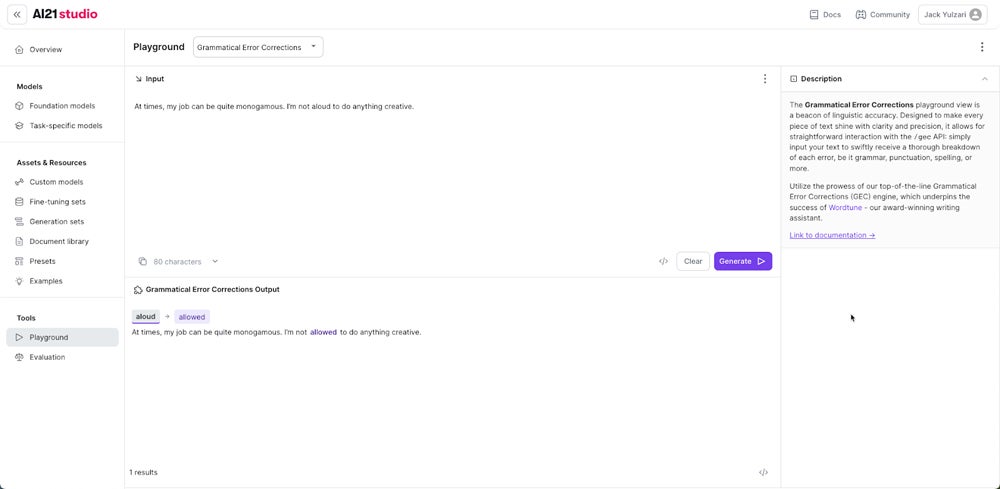

AI Software Benefits
AI software offers several benefits to businesses, ranging from better support for decision making to competitive advantage.
Enhanced Decision Making
With its ability to evaluate large datasets, AI can help enterprise users gain helpful insights from their existing data and operations. It can identify patterns, trends, and correlations that may not be readily apparent to human analysts, enabling businesses to make data-driven decisions and stay ahead of the competition.
Cost Reduction
Automating tasks and optimizing processes with AI minimizes or even eliminates costly errors and the need for manual intervention in various areas, resulting in cost-savings for businesses.
Personalized Customer Experiences
By analyzing customer data and behavior patterns with greater depth and intelligence, you can provide services tailored to your customer’s needs and offer customized customer support. Using AI for CX can boost your retention, loyalty, and customer satisfaction rates.
Workforce Augmentation
AI software can augment human capabilities and expertise, leading to a more skilled and efficient workforce. It can assist employees in their tasks, provide real-time guidance and recommendations, and enable them to leverage AI-generated insights effectively. This collaborative approach between humans and AI improves overall business operational performance and ultimately leads to increased efficiencies and revenue.
Competitive Advantage
Companies can gain a competitive edge in the market by leveraging AI tools, from optimizing marketing campaigns to improving sales forecasting and enabling better product development. Using AI in this way allows enterprises to drive innovation and capture the market early with loyal customers who want these advanced capabilities.
How to Choose the Best AI Software
Choosing the best AI software for your company can be challenging, as there are various factors to consider. Here are some steps to help you make an informed decision:
- Identify your business needs and how AI software aligns with those needs.
- Clearly outline the goals you want to achieve with AI software; SMART goals are a good way to develop clear, measurable, and achievable goals.
- Assess technical requirements, considering scalability, compatibility with existing infrastructure, programming language support, and data integration capabilities.
- Assess the learning curve for your team and research the availability of training resources, documentation, and support from the software provider.
- Evaluate customization options to determine whether AI software can be tailored to your business needs.
- Analyze the algorithmic capabilities of your chosen solution and consider whether the software supports deep learning, machine learning, natural language processing, or other AI techniques that are relevant to your needs.
- Check for data privacy and security features and policies.
- Evaluate vendor reputation and support quality.
- Complete product trials and demos for a better understanding of what you need and what works for your business.
- Consider the total cost of ownership (TCO).
- Seek expert advice if needed, consulting with AI experts or engaging a trusted technology advisor who can guide you based on your business needs and industry requirements.
These steps help to streamline the process of selecting the best AI tool for your business. No matter what, go into this decision-making process with a consistent, unwavering commitment to choosing software that aligns with your specific needs, technical capabilities, and long-term goals.
Bottom Line: AI Software Offers Competitive Advantages
There are thousands of AI software applications and services available, and many more are being released to the market daily. If my past research is any indication, several of these tool’s features will be updated and expanded within a few weeks or months.
Regardless of your industry, team sizes, functions, and technical expertise, there is an AI software solution out there that can help optimize your current business processes and boost your competitive advantage. Especially with the range of price points — including free and open-source AI tools — it’s worth investing the necessary time and research into identifying an AI solution or several that can help you run your business better.
For a full portrait of the AI vendors serving a wide array of business needs, read our in-depth guide: 150+ Top AI Companies






